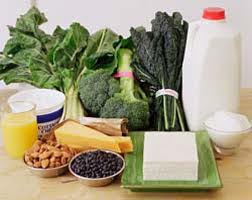
Menopause in a women’s life is the most crucial period. There are a lot of physical and emotional changes that a woman goes through during this phase. As women age, the bones become thinner and also reduce in density. This reduction and thinning of bones accelerates after reaching menopause. This is due to a drop in the production of estrogen after menopause which results in decreased calcium absorption and increased bone resorption. Thus, to improve the depleting bone density it is very important that women in their menopause period and after it, take enough calcium in their daily diet. It is found in various surveys that most of the menopausal women have calcium and iron deficiency. Women above the age of 51 years require 1,200 milligrams of calcium per day. Low calcium intake can cause serious bone diseases like osteoporosis where the bones become extremely week and can break easily.
Dairy products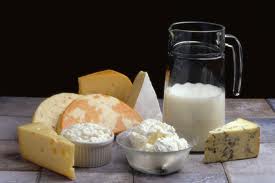
Dairy products are the most widely used foods for calcium and other nutrients. They are a good source of calcium for all ages. As we know that calcium is important for good bone health, but to absorb the calcium in our body we also need vitamin D. Women above the age of 50 requires 800 IUs of vitamin D. A cup of milk or 175 ml of yogurt contains around 300 mg of calcium. 1 oz of swizz cheese contain up to 270 mg of calcium. Dairy products can be a great source of the daily calcium requirements. But there is one disadvantage of whole dairy products. They are very high in saturated fats which can raise the blood cholesterol levels and increase the risk of heart attack. However low fat dairy products are always a healthier alternative.
Fish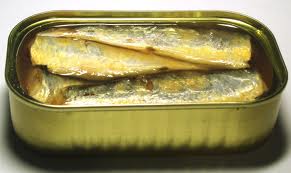
Fish are an excellent source of calcium to meet the daily recommended requirement. Fish can be eaten with other foods or on their own. Sardines with bones offer the most calcium. Only 4 oz of sardines can contain up to 242 mg of calcium. Three oz of salmon contains about 180 mg of calcium. These fish are not only good in their calcium content but also provide with essential omega3 fatty acids. These acids help in lower inflammation levels in the body. They also help in decreasing cholesterol levels. Consuming 2 to 4 grams of fish a day is usually advised. However, people with allergies to sea food should avoid eating them.
Tofu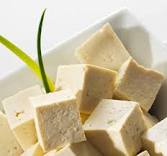
Tofu or bean curd is made from curdled soya milk. Half a cup of serving of firm tofu can contains about 227 mg of calcium which is about 22% of the RDA. Silken tofu is a softer kind of tofu which contains approximately 133 mg depending on the brand. 100 grams of fried tofu can provide up to 372 mg of calcium which is 37% of the RDA. Tofu is most commonly found in Asian foods, particularly Chinese food, but is now easily available in most parts of the world. However, depending on its brands the calcium contents in tofu may differ. To know the exact calcium content in the tofu of your choice you can check the packaging. Tofu is a good alternative to beef or chicken. You can use tofu in stir fry dishes. Tofu is also packed with isoflavones which are known to have great health benefits.
Sesame seeds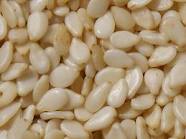
As sesame seeds bring loads of flavor to any dish, they also prove to be a great source to meet the daily calcium requirement, especially when they are roasted. Only a table spoon of sesame seeds contains up to 90 mg of calcium. Though there is bit of a controversy that surrounds this tiny seed. It was found in a study that one table spoon of unshelled sesame seeds contain about 88 mg of calcium, where as hulled seeds contain about 37 mg of calcium which is about 60% less. You can sprinkle roasted sesame seed on a variety of dishes or have them in form of tahini. Tahini is a spread made from sesame seed paste.
Almonds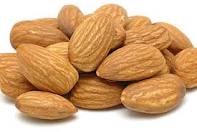
Almonds are also a great source of calcium. They are a perfect snack and can be eaten almost any time of the day. These munchable bites are good in any form: dry roasted or as almond butter. About 266 mg and 27% RDA of calcium can be obtained from every 100 g servings of almond. A cup of almonds can offer 367 mg of calcium which is 37% of the RDA. One ounce or 22 almonds provide about 74 mg of calcium which is 7% of the RDA. Just a table spoon of almond butter can provide up to 42 mg of calcium. Almonds have a high amount of saturated fat and some people can be allergic to them.
Green vegetables
A wide variety of greens contain calcium. In fact, nearly all greens contain calcium. Greens such as broccoli, collard greens, lettuces, spinach, Swiss chard, mustard greens, turnip greens and parsley contain calcium. Bok choy is a Chinese cabbage which is also a good source of calcium and half a cup of it has almost 97 mg of calcium. Just half a cup of boiled collards can provide up to 110 mg of calcium. Artichoke which has been boiled provides up to 135 mg of calcium. Every 100 grams of raw turnip greens contains 190 mg which is 19% of the RDA. Other half a cup of boiled vegetables such as kale, okra, mustard green, peas and squash can provide 20 to 99 mg of calcium. Apart from providing calcium, these greens are also good sources of fiber and nutrients which help in maintaining healthy body processes. A daily serving of 2 to 3 cups of greens is recommended. All meals should contain greens as part of a balanced diet.
Beans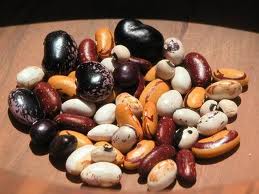
Beans are good almost any time of the year and are an excellent source of calcium. Black beans, white beans, hummus, kidney beans can offer a major part of the daily calcium requirement. Half a cup of boiled beans contain up to 23 mg of calcium, where as half a cup of hummus contains up to 62 mg of calcium. Half a cup of boiled navy beans contain about 61 mg of calcium. Having two to three servings of beans in a week can add in the calcium intake. Beans are also high in proteins and fiber. You can have beans in the form of soups, in refreshing salads, in chili or on their own.
Flax seeds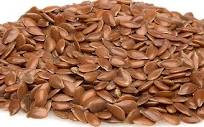
Flax seeds have an earthy, warm and a subtle nutty flavor. They are becoming increasingly popular as part of the regular diet of many health conscious people. Flax seeds are more known for their omega3 fats. But they also provide a good dose of calcium. 100 grams of flax seeds contain up to 255 mg of calcium with is 26% of the RDA. Having a table spoon of flax seed will give you about 26 mg of calcium which is 3% of the RDA. However, refined flax seed do not contain any calcium.
Seaweeds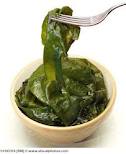
Most people do not know this, but edible seaweeds are super house of nutrients. They are abundant in nutrients and are great for all most every aspect of the body functioning. Seaweeds such as wakame, kombu and nori are great for bone health and joint functioning. These weeds contain high levels of magnesium which stimulates production of a hormone called calcitonin. This helps to increase calcium levels in the bones. Seaweed is also a terrific source of natural vitamin D which is essential for calcium absorption. What’s more, it contains fluorine which improves bone density and helps prevent osteoporosis. People with sea food allergies should avoid consuming seaweeds.
Calcium fortified food products
Fortified foods such as orange juice and cereals are good if you want to add in calcium to your daily diet. But these fortified foods should not replace other calcium rich foods. And foods like leafy greens, dairy products and fish should be part of the daily diet. To know the amount of calcium contained in these product you can read the nutritional facts on their packaging. These fortified foods are the most common foods around and can offer a good part of the daily calcium recommendation.
Brazil nuts
Brazil nuts are probably the largest of all nuts and are also a great source of calcium. Just 100 grams of Brazil nuts can provide up to 160 mg of calcium which is 16% of the RDA. An ounce or just 6 nuts contain about 45 mg of calcium. Apart from bring high in their calcium content, these nuts are very nutritious. They are packed with nutrients such iron, minerals, copper, magnesium, potassium, manganese and zinc. They also contain riboflavin, thiamine and niacin and healthy levels of vitamin E and folate. Having a few Brazil nuts daily can certainly add to the DRA of calcium. However, people who are allergic to nuts should completely avoid eating them. Also, as all nuts are rich in calories, over eating them can increase cholesterol levels.


